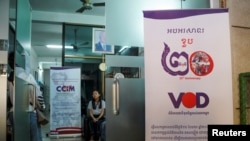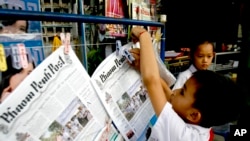On February 13, Cambodia’s Prime Minister Hun Sen shuttered the independent Voice of Democracy (VOD) news outlet after a disputed report on the government’s disaster relief for earthquake-hit Turkey.
VOD reported that Hun Sen’s eldest son, Hun Manet, who is poised to succeed his father after a general election this summer, had acted on his father‘s behalf by signing a financial aid package to earthquake-stricken Turkey.
Hun Manet disputes that.
But government officials also said that it would not have been improper for Hun Manet to approve the aid package.
Others speculate VOD fell afoul of authorities after reporting on cyber-scams implicating powerful individuals.
Following international backlash, Hun Sen said “the opinion of some foreigners” will not lead to VOD’s reopening.
He claimed VOD’s closure would strengthen Cambodia’s media freedom environment and improve the “professional ethics of journalists.”
But United Nations Human Rights experts said the revocation of VOD’s media license “leaves virtually no free media outlets operating in the country,” as VOD “was one of Cambodia’s last remaining independent media outlets.”
Human Rights Watch (HRW) agreed, saying that by closing VOD, the government had “effectively eliminated all vestiges of media freedom in Cambodia.”
In January, The CIVICUS Monitor, a global advocate for civil society and civil rights, ranked Cambodia as “repressed,” noting that laws are “routinely misused to restrict civic freedoms,” including restrictions on journalists.
VOD’s closure underscores that assessment.
Hun Sen’s appeal to the “professional ethics of journalists” fits into a broader government effort to control media.
In 2021, Cambodia’s Ministry of Information established a Monitoring Committee for Journalism Ethics, which empowers the ministry “to appraise or punish” media outlets and journalists.
That committee is overwhelmingly made up of government officials.
The press advocacy group Reporters Without Borders (RSF), which ranked Cambodia 142 out of 180 countries in its 2022 Press Freedom Index, said the committee, “without any transparency,” is being used to silence media that reports critically on the government.
That lack of transparency dovetails with Hun Sen’s decision to shutter VOD without due process, U.N. experts say.
Cambodia’s Press Law does prohibit publishing false information injurious to “national institutions.”
But in an open society, what Hun Sen categorized as VOD’s “serious insult” against the government would not result in a media outlet being closed.
Observers have also linked the press freedom crackdown to Hun Sen’s desire to retain his 37-year grip on power.
Amnesty International said that VOD’s closure sent “a clear warning to other critical voices months before national elections,” slated for July 23.
Phil Robertson, deputy Asia director at HRW, said closing VOD “may spell the end for the media environment necessary for credible elections.”
In August 2022, the United Nations High Commissioner for Human Rights said in a report that press freedom in Cambodia was in a “perilous sate” as it prepared for a general election.
The U.N. Human Rights Office in Cambodia and local nongovernmental organizations like the Cambodian Center for Human Rights have documented numerous cases of journalists facing prosecution over their reporting.
This campaign against the media has been raging for years.
RSF said that Hun Sen had “launched a ruthless war against independent journalism before the 2018 elections,” including an outright ban on radio and newspapers critical of his government and a “purge” of staff at non-compliant news organizations.
The Phenom Penh-based Cambodian Center for Independent Media reported in February 2018 that the “facade of media freedom collapsed in 2017.” It noted that journalists were being accused of “incitement” and espionage amid claims that “foreign agents” were working to overthrow the government.
Authorities forced The Cambodia Daily, which reported on corruption and human rights abuses, to close in September 2017.
In May 2017, Cambodia’s government reportedly “coerced” the sale of The Phnom Penh Post newspaper to a Malaysian investor with ties to Hun Sen.
In August 2017, Cambodian authorities closed 32 FM radio frequencies across 20 provinces, specifically those broadcasting Khmer-language news from the Voice of America, Radio Free Asia (a U.S.-funded, VOA sister news service) and VOD.
After banning the main opposition party, Hun Sen’s ruling Cambodian People's Party won every seat in the National Assembly in 2018.
The COVID-19 pandemic also was used as a pretext to stifle a free press.
Dozens of non-governmental organizations lamented in May 2021 that journalists had increasingly become vulnerable to prosecution “for their legitimate reporting activities on the topic.”
The NGOs reported that journalists were routinely threatened or attacked with no recourse to justice.
Read More: Cambodian Journalists Are Telling Truths, Not Breaking Laws
Read More: Ahead of an Epochal Election, Cambodia Turns Courts Against Opposition






